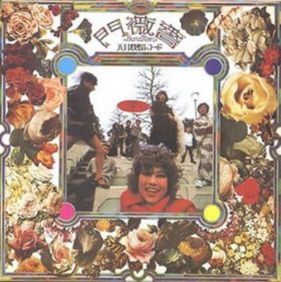Togo Takeshi — better known as Ken Togo — was born on June 10, 1932 in Kakogawa City in the Hyogo Prefecture of Japan. He came from a highly political, very high profile family. After graduating from Kwansei Gakuin University in 1955, he worked a series of jobs ranging from chicken farm manager to bank clerk. In 1963, he caused a huge scandal for his family, when he left his respectable bank job and wife and children, openly proclaimed his homosexuality and began managing a gay bar in Himjei City. Under his management, he actually pushed the bar’s finances out of the red and it began to turn a profit — nevertheless, it closed two years after he took it over due to problems with employees and the administration. In 1968, Togo opened up a new gay bar in Tokyo which he called “Togoken” — although this bar was also destined for financial ruin.
Soon, Togo became heavily involved in politics with a political platform based around the radical queer politics — this was revolutionary in a global way. In the early ’70s in New York City and San Francisco, most queer activists were trying to get the LGBTQ+ community accepted into the “respectable” mainstream, Togo was rejecting the heteronormative mainstream culture entirely. He advocated against discrimination towards sexual minorities — not just homosexual and bisexual people, but also the BDSM community and sex workers. He advocated for gender equality — for women, and for transgender people. (Although, controversially, he did not believe that transgender people working in entertainment should get gender reassignment surgery in a train of thought that basically amounts to “artists need tension in their lives to create good art.”) He also advocated for other minorities often ostracized by Japanese society — including disabled people, children born out of wedlock. He also fully believed that capitalism was inherently bad for the disenfranchised and loudly proclaimed himself a socialist. He fashioned himself as “the okama Togo Ken” (which translates roughly to “the faggot Ken Togo”), formed a political party called “the Miscellaneous People’s Association” in 1971 and began to run for office. Between 1971 and 1995, Togo ran for office nearly a dozen times — though he was never elected. During the ’80s, Togo also included AIDS activism as a major part of platform.
Togo’s radical politics garnered him international attention — though not always of the positive kind. (Although his only English-language interview was with The Advocate in 1983.) He lost every election he ran for — not only because of rampant homophobia and because of his radical positions — but because he, essentially, made a mockery of the Emperor. He likened the coming out experience of queer people to the end of World War II — when the Emperor declared (at the behest of Allied forces) that he was not divine, but was now human. The Japanese people accepted this pronouncement, and Togo was certain it should be easier to accept when someone comes out as gay or transgender than when someone comes out as no-longer-a-god. He also named his cat “Chin” to mock a word for “we” reserved for use by the Emperor and liken it to slang for the penis. This did not make him a favorite person of many people in Japan.

Togo also released a couple of albums, the first in 1972, with a focus on queer-themed music. He also worked occasionally as an actor, director, and occasional pornographer — always with a political bent, bringing awareness and attention to his radical views. He also began publishing a magazine called The Ken — highly political, but also flagrantly defying Japan’s censorship laws (which Togo was opposed to) through the publication of pornographic images.
For several years, he was on friendly terms with the Japan Socialist Party — until 1978. In that year, Itsuro Kosaka published a statement in the Shukan Post that decried homosexuality as a disease and Togo publicly cut all ties with the party. Around this time, much of the rest of the queer community began to feel animosity with Togo because of his publicly effeminate appearance (he frequently wore makeup and dressed quite outlandishly) and his efforts to reclaim the term “okama“. Nevertheless, when he rebranded The Ken into The Gay in 1978, it became exceedingly popular. He began holding public photoshoots of his models.
In 1987, returning to Japan from San Francisco, Togo became embroiled in scandal because, upon searching his bags, customs found numerous videos and publications that were not permitted under Japan’s censorship laws. The items were confiscated, but Togo was additionally fined under charges that he intended to distribute the items. Togo fought the charges, going to court and claiming they were for his private use. Initially, he lost the court fight — but on appeals, the court found in his favor. Unfortunately, customs appealed further and the legal battle made it all the way to Japan’s Supreme Court — which found in favor of customs, and forced Togo to pay the fine and all of the (considerable) court costs.
By 2002, Togo’s effeminate image and radical positions had set him apart from most of the queer community in Japan. At a meeting regarding the discriminatory language regarding AIDS in the media, a number of Japanese LGBTQ+ activists including Hasegawa Hiroshi and Ōtsuka Takashi spoke about how they did not feel represented by Togo’s presentation of the gay identity. Togo remained a prominent figure to many in Japan’s transgender community, however, including Miyazaki Rumiko.
Although he was less politically active in his later years, he continued to espouse his views from his small bar (BAR Togo Ken — I have no idea when he established it) every night until 2011. He passed away on April 1, 2012. His children held a small, private funeral for him — but his friends and customers held a large celebration of his life at Togo’s bar the following July 1.